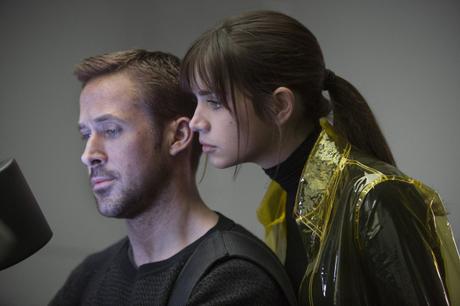
It didn’t make much dollar at the box office. And neither did its predecessor. There are complaints that its too long. But then people complained the original was too slow.
Blade Runner 2049 is not short of critics…and plain old-fashioned apathy amongst the movie going public.
Full disclosure – I went to see this movie FOUR times at the cinema. Why? Because box office and buzz are not always good measures of an important movie. Sometimes the important movies come and go unnoticed…because their significance isn’t generally recognised. (e.g. Blade Runner…The Shawshank Redemption…etc)
So – why do I think the sequel to the original Blade Runner movie is significant? There are many reasons. I’m going to put my finger on one. And I will give some PLOT SPOILERS in the process.

Still here? Good.
The original Blade Runner focussed its narrative on REPLICANTS, artificial humans. Blade Runner 2049 continues this narrative. Only more so. In fact, the film’s protagonist – Agent K – is himself a replicant – there’s no mystery here…its revealed within the opening minutes of the movie. The story does this…partly because the healthy humans in this universe live in the off-world colonies…and this story is set on earth. But the deeper reason is because replicants help us – the viewing audience – understand ourselves.
What are replicants? They are sophisticated androids that are virtually indistinguishable from human beings. You’ve got to know what you’re looking for to spot a replicant. That’s why skilled Blade Runner units are required to track down the replicants of interest in society. It’s also why we in the audience can find ourselves empathising with these characters and their experiences.
I’ll go further than that. We don’t just empathise with the replicants. We recognize ourselves in them – not just in the choices they make, but in their ontology – what makes them “them”.
Replicants are material constructs…sophisticated biological mechanisms that serve a purpose amongst other sophisticated biological mechanisms. Yet they long to be more. Some long to live longer. Others long for their “lives” to be filled with deeper significance in fulfilling relationships.
Is this any different from the way so many people live their lives today?
People’s world view often has no place for God. Their naturalistic assumption is they are only physical, complex biological computers lacking an essence or soul. There were constructed in line with the physical laws laid down in our Universe. But they don’t transcend them in any way. This life is all there is. There’s no purpose or significance beyond it. Craig puts his finger on the inevitable consequences of such a world view:
“There is no God, and there is no immortality. And what is the consequence of this? It means that life itself is absurd. It means that the life we have is without ultimate significance, value, or purpose.”[1]
That’s why I find Blade Runner 2049 such a profoundly moving experience to watch. Because it shows “people” coming to terms with the reality of a meaningless, absurd life. And I think so many of us in the real world today are facing that same dark and hopeless discovery.
Longing for Meaningful Relationships:
Agent K’s treasures his girlfriend, Joi. She too is an artificial person. Yet she’s not physical – just a portable hologram that speaks encouraging and loving words to him. Perhaps there’s more to Joi because we see her devotion to K in her desire to experience a physical relationship with him. And also – to name K. There’s nothing so intimate with another person – than to share a special name. She names him Joe.
K tragically loses his precious Joi, that meaningful relationship comes to an abrupt end. In one truly heart-breaking moment, while reflecting on his loss, K watches an advert selling the Joi hologram product to prospective customers. And he suddenly realises that Joi’s special name for him – Joe – is just simply part of the standard package. All the Joi’s do it. There’s nothing special or unique after all about his Joi, and also his time with her because in reality he was simply using a mass produced product.
Here’s the reality for us today – if we view people as biological products – then I don’t think there’s any ultimate meaning to our existence. No ultimate meaning in relationships with other products. We just exist – interact. Anything that does occur – might seem important at the time. But because reality has no meaning – these experiences will therefore also have no ultimate meaning.
Yet there’s a drama in Blade Runner 2049…that mirrors the real world. K intuitively knows there’s more to it than that. K gives voice to the inner sense within us – the audience – that human beings are MORE than just biological products. We are people with potential – our lives have meaning – and that’s why we spend our lives looking for meaning. Outrage builds within us…no, there is more than this. I am more valuable than that!
Longing for a Purpose Greater than Ourselves:
The movie presents some grand and overarching concepts. Yet its final act suddenly narrows in and focusses down on a very personal mission.
Agent K tracks down Rick Deckard, who had been in exile since the events of the original movie. K finds an opportunity to achieve a bigger more important purpose with the rest of his “life”. Deckard has a child that he’s never met and known. Agent K decides he’s going to allow Deckard to finally meet and know his child…to build the real and meaningful relationship with them that he’s been longing for himself.
K essentially sacrifices his life – to allow Deckard to know his child. In a scene poignantly reminiscent of Rutger Hauer’s “Tears in Rain,” K saves and lifts Deckard to safety. But not just safety…to meaning and a future with the child he’s never met.
The significance of this task is unquestioned by K. That’s probably one reason why he’s willing to die to achieve it. In his last moments…do we see him praying in the snow? Or are his lips just moving as his system breaks down?
As an audience – we’re left reflecting on K’s selfless, heroic act. And we know that the outcome is worth the sacrifice. We intuitively know that there are some things in the world that are truly noble, some purposes that are greater than us. Reuniting families, restoring broken relationships is one of them.
Meaning and Purpose Because there’s a God:
In his press tour, I heard Harrison Ford describe the Blade Runner 2049 story as, “the triumph of the human spirit.” Personally, I’m more struck by its rage against the meaningless…the sense that ultimate value and meaning does exist in the universe, even though life seems to try and convince us otherwise.
And if that’s true – and I think it is – it’s only because there’s a transcendent person who is responsible for everything, who gives it meaning. A loving God who crafted us, who chooses to give the ultimate purpose and meaning that transcends our seemingly absurd lives.
I’d suggest that – if there are resonances within us that question, and rage against the seeming meaningless and absurdities of life…its because actually life isn’t absurd. There is a God with a purpose and plan for our own good. We aren’t biological products. We’re much loved children.
[1] William Lane Craig, Reasonable Faith, (), 72.

